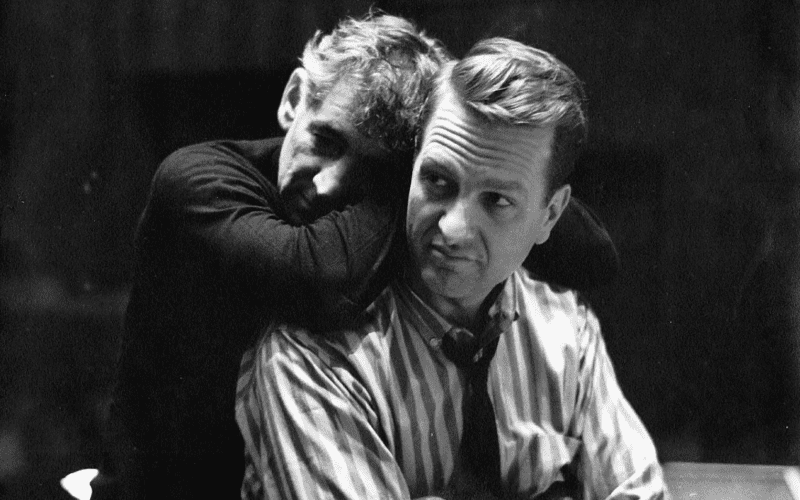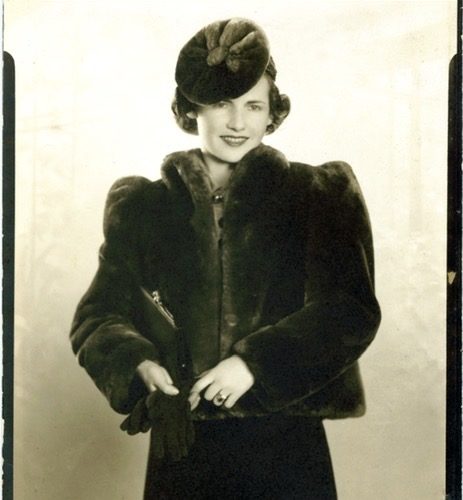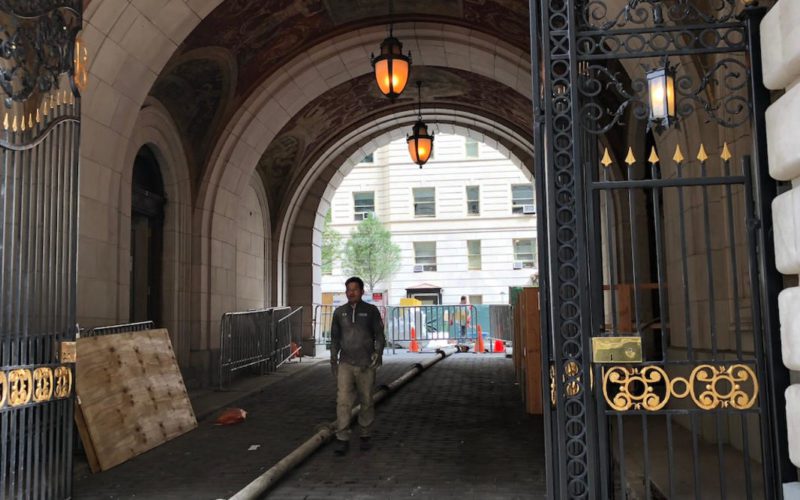

William Yardley, The New York Times, Jan. 24, 2014
John McClure, a producer and engineer who helped shape some of the most celebrated classical recordings of the 20th century, including acclaimed sessions with Bruno Walter, Igor Stravinsky and Leonard Bernstein, died on June 17 at his home in Belmont, Vt. He was 84.
His death, after a brief illness, was announced by his family.
Mr. McClure was neither a classically trained musician nor a formally trained technician. He studied piano at Oberlin College in the late 1940s but dropped out. He learned to operate a recording console at Columbia Records in the early 1950s and stayed.
“The impostor continues undiscovered,” he sometimes said to those close to him, a self-effacing wink at his lack of traditional qualifications.
“A sort of titan of the music world.”
John Williams, composer
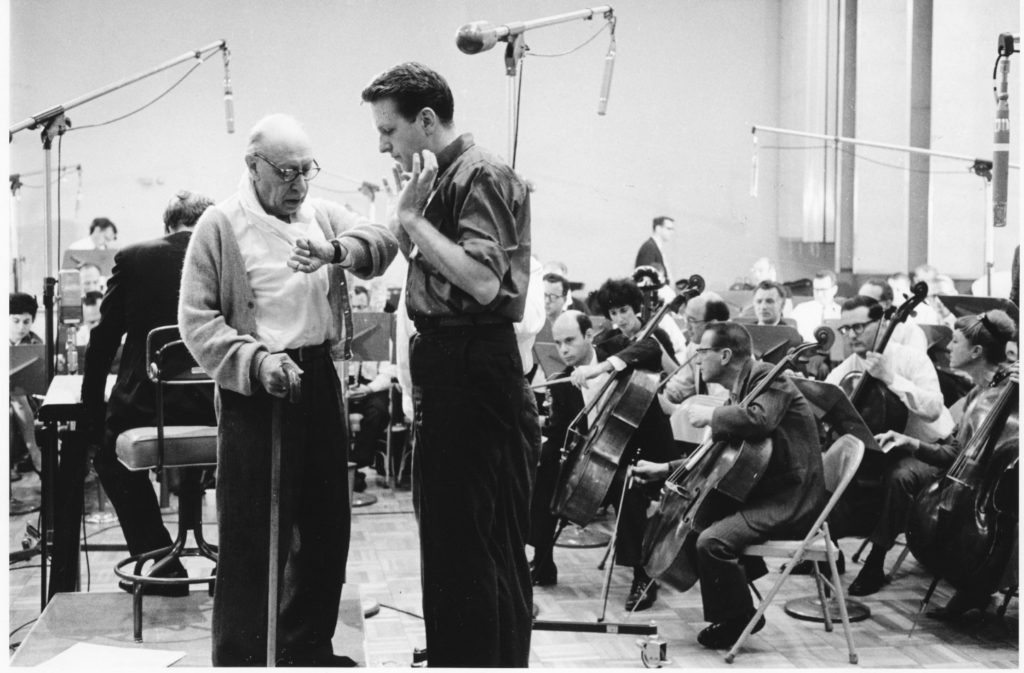

Remembering John McClure (1929-2014)
by Humphrey Burton, Prelude, Fugue & Riffs, 2014-15 Fall/Winter
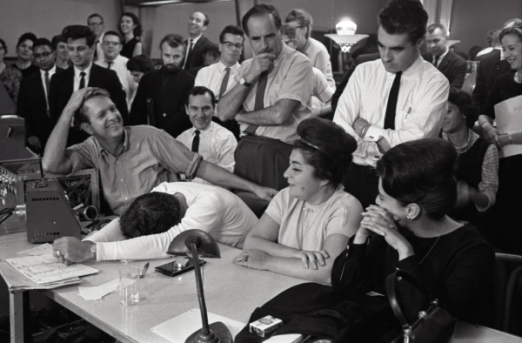

I first met John close on half a century ago when he came to London to produce the recording of Mahler’s Symphony of a Thousand in the Royal Albert Hall, which was later named best recording of the year. He was a model of affability and unflappability, even when dealing with the enormous problems involved in taping (and televising) Mahler’s sprawling masterpiece with an amateur chorus which clearly wasn’t quite up to Mr. Bernstein’s expectations. I loved the stylish way John dressed; I loved the way he prepared his scores and distributed his microphones; I loved the way he handled the maestro. Our rapport was instantaneous and it grew over the years into a deep personal and professional friendship.
We worked side by side, I doing the pictures and he the sound, on all Leonard Bernstein’s music films for Unitel, ranging from the symphonies of Mahler and Beethoven to works by Bernstein himself, nearly two hundred titles in all, many available on DVD to this day. Starting as his producer at Columbia Records in the 1960s, John was Mr. Bernstein’s trusted personal sound man; as such, McClure had to tread a particularly diplomatic path with his colleagues at Deutsche Grammophon, who simultaneously made recordings of virtually all the works Bernstein conducted with the Vienna Philharmonic in the 70s and 80s.
Another DG assignment, the BBC’s 1985 fly-on-the-wall documentary entitled The Making of West Side Story, provides a closeup of John at work in a New York recording studio. “I’m so excited,” we hear John say near the top of the film, and so he was: he never lost his enthusiasm for music. The joshing and badinage between Bernstein and McClure is one of the film’s running features. When John asks for a re-take, Lenny teases him (for all to hear) by suggesting that it’s only needed because he didn’t have the mikes open at the right spot. Ever the diplomat, John laughs it off. When Jose Carreras balks at the fence of his top B flat in Maria and tempers threaten to flare, John is quick to defuse the situation, announcing over the PA system that the session has run out of time anyway. In general he is happy to take the flak, to play the Fool to Bernstein’s Lear. The recording won a Grammy.
John was a natural, instinctive musician and somewhat diffident about his lack of formal training. He told an interviewer he preferred to involve conductors and soloists when listening to the playbacks and deciding which “takes” to select. “I didn’t have much faith in my musicianship,” he added, but he needn’t have worried: I found him pretty well infallible, and I admired the up-front aural presence he achieved with his recordings: they have warmth, clarity and energy — just like LB himself.
John was blessed with incredible stamina. His recording sessions with Bernstein and the New York Philharmonic were legendary. “In those days,” he recounted to the same interviewer, “a session was a three hour minimum call; but then you just kept adding units and sometimes we’d go 7-8-9 hours straight until we couldn’t stand up… and that was amazing.”
On the concert platform preparing for sessions, he was never a prima donna; in fact he identified with my need, as film director, to create “clean” pictures of the musicians and their instruments. He was immensely helpful when it came to keeping microphones and cables out of the camera shots. So John was both a team player and a star — as tall and handsome as a Hollywood cowboy, but without an ounce of pretension. Behind the easy-going façade there was a man of great integrity and a musician of the first rank. I count it a privilege to have worked beside him.
[Photo: John McClure and Leonard Bernstein the studio; Photo by Don Hunstein (1963), courtesy of Sony Classical.]“John was both a team player and a star — as tall and handsome as a Hollywood cowboy, but without an ounce of pretension. Behind the easy-going façade there was a man of great integrity and a musician of the first rank.”
Humphrey Burton on John McClure

